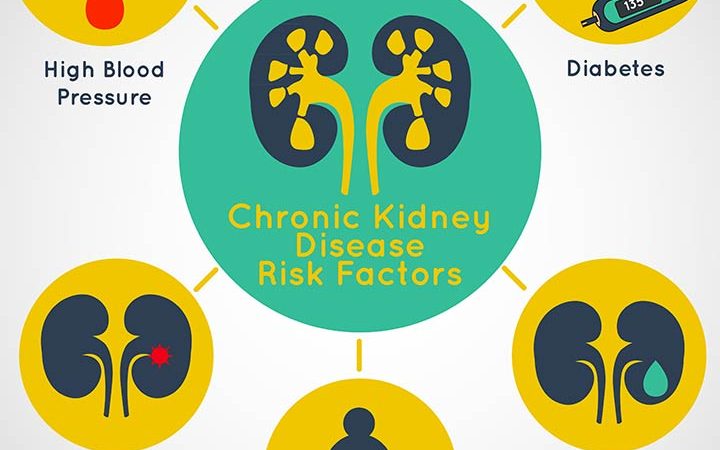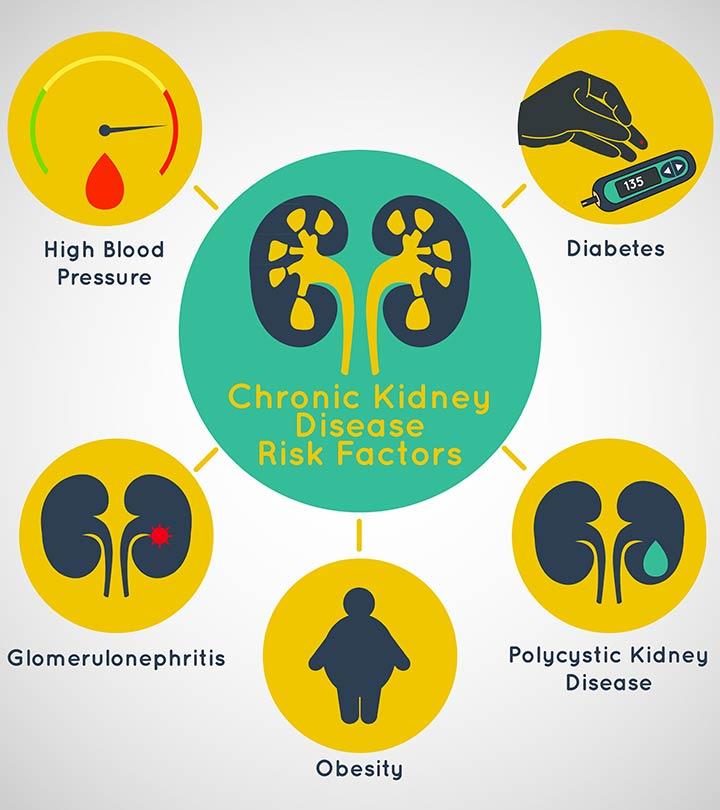Kidneys play an important role in the body by controlling the water levels and eliminating wastes. Kidney diseases may be acute (sudden) or chronic (permanent) (1). Genetic kidney diseases are more common in children than in adults (2). These diseases can be diagnosed during prenatal testing and treated with medicines or surgery. Other kidney problems, such as urinary tract infections, develop later (1).
Read the post to know about the types, causes, symptoms, risk factors, diagnosis, and treatment of kidney disease in children.
How Common Is Kidney Disease In Children?
Around one or two in every 100,000 children under the age of 19 can develop kidney failure. African American teenagers are thrice more likely to develop kidney failure than Caucasians of the same age. Moreover, boys are twice as likely to develop kidney disease as girls (3).
What Are The Types Of Kidney Disease In Children?
Kidney diseases that develop from birth are (1):
- Posterior urethral valve obstruction: It is obstruction or narrowing of the urethra. The disease occurs only in boys and can be treated with surgery after birth
- Fetal hydronephrosis: One or both kidneys are enlarged because of the obstruction in the developing urinary tract, or when the urine flows backward from the bladder into the ureters (vesicoureteral reflux). This condition is diagnosed in babies before birth and may sometimes be treated with surgery.
- Polycystic kidney disease: Fluid-filled cysts develop in the kidneys that multiply, leading to kidney failure. Polycystic kidney disease is mostly inherited and can be diagnosed before or after the child is born. The disease is treated with dietary changes in some cases, but a kidney transplant or dialysis is needed.
- Multicystic kidney disease: Large cysts develop in one of the kidneys that have not formed properly. The affected kidney eventually stops working; however, children with this disease can lead a normal life with the other healthy kidney. It can be diagnosed before birth, and surgery is needed only in rare cases.
- Renal tubular acidosis: The disease occurs when kidneys cannot remove acids from the blood. It can affect a child’s growth and cause kidney stones and bone disease. Immediate treatment is important to prevent these complications.
- Wilms Tumor: Wilms Tumor, also known as nephroblastoma, is rare kidney cancer and is treatable. Children with this disease can lead a normal life after treatment. The tumor is believed to grow with the fetus in the womb.
- Glomerulonephritis: Glomerulonephritis is a condition where the kidneys are unable to clean the blood. As a result, children experience swelling in the body or difficulty with urinating. If left untreated, the disease may lead to kidney failure. Dietary changes and medicines are used to treat the condition.
- Nephrotic syndrome: Nephrotic syndrome occurs because of the damage in the blood vessels of the kidneys. In this condition, kidneys pass excess protein in the urine.
Sometimes, the baby’s urinary tract does not develop properly in the womb, leading to kidney problems. These congenital problems are:
- Duplication of the ureters, in which a kidney has two ureters rather than one. This condition can cause urinary tract infections and can be treated with medicines or surgery.
- Horseshoe kidney, in which two kidneys are fused into one arched kidney. It functions normally but needs to be regularly checked by healthcare providers.
Other problems associated with kidneys
Sometimes, other health conditions in children might prevent the kidneys from functioning normally. They include:
- Hypertension (high blood pressure)
- Kidney stones
- Nephritis (inflammation of the kidneys caused by infection or autoimmune disease)
- Urinary tract infections (UTIs) (bacteria enter the bladder or kidneys)
What Are The Causes And Risk Factors Of Kidney Disease In Children?
Several factors can increase the risk of kidney disease in children.
Acute kidney disease
- Reduced blood flow in kidneys due to surgery, dehydration, blood loss, or shock
- Blockage in the urinary tract
- Medicines that cause kidney problems
- Conditions such as cardiac arrest slow down or block the oxygen and blood flow into the kidneys
- Hemolytic uremic syndrome is caused by E.coli infection, where it leads to kidney failure because of blocked small blood vessels and structures (4)
Chronic kidney disease
- Blockage in the urinary tract for a long period
- Alport syndrome (an inherited disorder that causes deafness, eye problems, and kidney damage).
- Cystinosis (an inherited disorder where amino acid called cystine accumulates in the kidneys).
- Untreated acute kidney disease may also turn chronic if not treated on time.
- Other conditions include untreated diabetes, hypertension, chronic urinary tract infection, and lupus (4).
Apart from these factors, kidney disease in children can also occur from birth defects. These defects occur while the baby is growing in the mother’s womb. The common birth defects are (5):
- Babies born with a single kidney (renal agenesis)
- Babies born with two kidneys, one of which does not function (renal dysplasia)
- Babies born with dislocated kidneys (ectopic kidney)
Most children born with these birth defects do not face any major problems; however, it is important to contact a child’s specialist.
What Are The Symptoms Of Kidney Disease In Children?
The symptoms of acute and chronic kidney disease may differ from each other.
Some common symptoms of acute kidney disease are (4) (6):
- Fever
- Rash
- Hemorrhage
- Chronic nausea and severe vomiting
- Abdominal pain
- No urine or excess urine
- Diarrhea with bleeding
- Pale skin
- Swollen tissues
- Inflamed eyes
- Mass in the stomach
Some common symptoms of chronic kidney disease are (2) (4) (6):
- Chronic nausea and vomiting
- Bone pain
- Poor appetite
- Severe headache from high blood pressure
- Improper growth
- No urine or excess urine
- Frequent UTIs
- Urinary incontinence
- Pale skin
- Mass in the stomach
- Hearing impairment
- Bad breath
- Swollen tissues
- Irritable behavior
- Change in alertness
- Poor muscle tone
- Weakness and fatigue
- Change in the urine color, indicating blood
- Extra foam formation in urine, indicating protein
What Are The Complications Of Kidney Disease?
Kidney disease or failure may lead to several complications as follows (4):
- Anemia (low level of red blood cells in the body)
- Heart problems
- Bone disease
- Bone, joint and muscle pain
- Improper mental function, leading to confusion, less concentration, and dementia
- Nerve damage in upper and lower limbs
- Highly prone to infections
- Poor nutrition
- Dry and itchy skin
How Is Kidney Disease Diagnosed In Children?
If healthcare providers suspect the child has kidney disease, they will start with a medical history and physical examination. Then, further diagnostic tests are done to confirm the disease (1) (4) (7) (8) :
- Blood tests: A blood sample is examined to check the kidney function (amount of blood the kidney filters in a minute), blood cell count, and electrolyte levels.
- Urine test (Urinalysis): This helps detect abnormal functioning of the kidneys. The test indicates inflammation in the urinary tract and detects excess white cells caused due to infection.
- Renal ultrasound: This is an imaging test that enables doctors to see the shape and size of the kidneys. The test also helps to examine the presence of cysts, stones, or any other growth in the kidneys.
- Kidney biopsy: In this procedure, a small sample of the kidney tissue is taken with the needle and examined in the lab. It helps to accurately understand the functioning of the kidney and the extent of the damage.
- Bone scan: This nuclear imaging method helps examine the signs of bone diseases, tumors, or inflammation.
- Chest X-ray: This test enables doctors to understand the functioning of the lungs and heart.
- Electrocardiogram: This test enables doctors to understand the heart’s functioning and rule out any chance of heart tissue damage.
How Is Kidney Disease Treated In Children?
The treatment of kidney disease in children depends on the cause and severity of the disease.
The treatment for acute kidney disease includes (4):
- Hospital admission
- Intravenous fluid administration to replenish the fluid loss
- Diuretics to increase the amount of urine
- Tracking electrolyte levels in the body
- Medicines to control blood pressure
- Dietary changes
The treatment for chronic kidney disease includes (4):
- Medicines to address bone problems and anemia
- Dietary changes
- Dialysis
- Kidney transplant (removing the damaged kidney and replacing it with a new one)
Some specific treatments for the causes leading to kidney diseases are (7):
- Birth defects: Treatment is generally not required for children with kidney disease due to birth defects. Doctors continue to observe the patients over a period and might perform surgery if there is a blockage or damage to the kidney.
- Hereditary diseases: Children with polycystic kidney disease are given antibiotics to fight urinary tract infections and other complications.
- Infections: Children with hemolytic uremic syndrome need to maintain their electrolyte and fluid levels. In some cases, they may also need a red blood cell transfusion. Some children need dialysis for a short period, while most children recover after the treatment.
- Trauma: If children have kidney disease due to trauma, they are first treated for trauma. They may also require dialysis for a short time until the kidney function resumes.
- Urine blockage: Mostly, the blockage resolves on its own. If the blockage continues, surgery is performed to remove it.
Dietary Changes During Kidney Treatment
In the course of kidney treatment, diet plays an important role. Some dietary changes your child might need to make in the diet are (4):
- Reduce the protein intake because the kidneys may not efficiently eliminate the excess protein.
- Limit food containing potassium because the excess potassium may accumulate in the blood (hyperkalemia), which can be life-threatening (9).
- Avoid phosphorus-containing foods because extra phosphorus can cause calcium to leave the bones.
- A low-sodium diet helps reduce fluid retention in the body.
If your child is suffering from kidney disease, create a safe and accepting environment for them. Inform them about their health condition, treatment and dietary changes. Talk about your experience with the doctors, nurses, family and friends. Sharing your feelings with others can help you deal with the situation better.
References:
MomJunction’s articles are written after analyzing the research works of expert authors and institutions. Our references consist of resources established by authorities in their respective fields. You can learn more about the authenticity of the information we present in our editorial policy.
Recommended Articles
The following two tabs change content below.




































